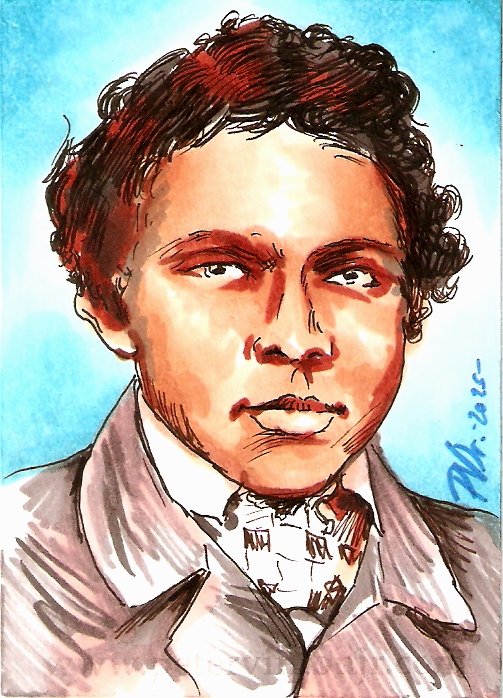Lesson 202:
Abraham Galloway
An ongoing illustrative history study
This piece originally posted on 09/24/2025
 Continuing on with the subject that certain "patriotic" government officials really don't want you learning about, today we look at the monumental accomplishments of Abraham Galloway. Born enslaved in 1837 North Carolina, Galloway was the son of a white boatman and an enslaved woman, Hester Hankins. At the age of 20 he escaped aboard a coal ship, remaining hidden below decks for weeks until reaching Philadelphia, and then (by way of the Underground Railroad) ultimately to Canada.
Continuing on with the subject that certain "patriotic" government officials really don't want you learning about, today we look at the monumental accomplishments of Abraham Galloway. Born enslaved in 1837 North Carolina, Galloway was the son of a white boatman and an enslaved woman, Hester Hankins. At the age of 20 he escaped aboard a coal ship, remaining hidden below decks for weeks until reaching Philadelphia, and then (by way of the Underground Railroad) ultimately to Canada.
While in Canada Galloway wasn't content to merely enjoy his freedom; he became vocally active in militant abolitionist circles. It might be argued that he had in him a fierce desire to see the entire institution that had once enslaved him --and all of its supporting structure-- to be burned entirely to the ground. (I guess today's FBI would classify him as an NVE; "Nihilistic Violent Extremist.") Once the Civil War was underway, Galloway returned to the South, not only as a recruiter (advocating to fill the ranks of what would eventually become Gen. Edward Wild's African Brigade and also pushing for equal pay for Black soldiers and educational opportunities for their children and families), but also as a spy.
As the war waned, Galloway didn't exactly let up; he merely shifted his focus to the political struggle for equal treatment. He even registered Black voters --something largely unthinkable at the time-- and organized the Equal Rights League, which lobbied for rights for freed people: including education, protection from violence, and the right to vote. Galloway and the league then organized North Carolina's first Freedmen's Convention, held in Raleigh in September 1865, to represent the interests of the state's Black population as the constitutional convention convened across town. Unpolished and impatient, Galloway spoke at rallies with armed guards close at hand, mindful that he was very much on a Ku Klux Klan target list.
Galloway's crowning achievement came in 1868, when he was among the very first Black men to be elected to the North Carolina state senate. The following year he was chosen as a presidential elector: becoming the first Black person to serve in the electoral college. That same year he was named as Commander of the 1st Regiment defense militia, in tandem with his active support of the Shoffner Act: a bill to create a state militia to combat the Ku Klux Klan. Sadly he died in office at the age of only 33. His funeral was held in Wilmington, with more than 6,000 people attending.
More at NPR: "Abraham Galloway is the Black figure from the Civil War you should know about," from All Things Considered, originally aired on February 8, 2022.
Next lesson - Lesson 203: William B. Gould
Return to www.petervintonjr.com Main Page
 Continuing on with the subject that certain "patriotic" government officials really don't want you learning about, today we look at the monumental accomplishments of Abraham Galloway. Born enslaved in 1837 North Carolina, Galloway was the son of a white boatman and an enslaved woman, Hester Hankins. At the age of 20 he escaped aboard a coal ship, remaining hidden below decks for weeks until reaching Philadelphia, and then (by way of the Underground Railroad) ultimately to Canada.
Continuing on with the subject that certain "patriotic" government officials really don't want you learning about, today we look at the monumental accomplishments of Abraham Galloway. Born enslaved in 1837 North Carolina, Galloway was the son of a white boatman and an enslaved woman, Hester Hankins. At the age of 20 he escaped aboard a coal ship, remaining hidden below decks for weeks until reaching Philadelphia, and then (by way of the Underground Railroad) ultimately to Canada.